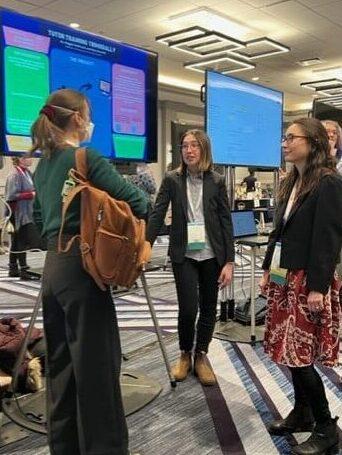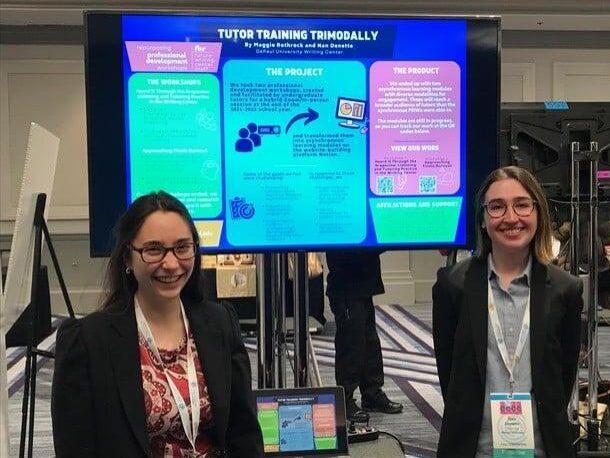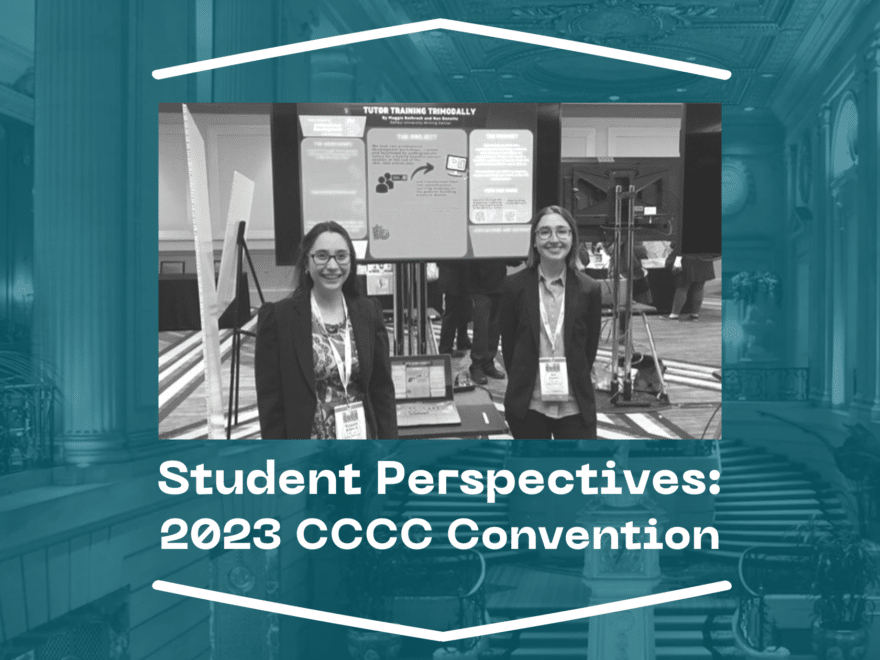After several years of online and hybrid conventions, the Conference on College Composition and Communication hosted a primarily in-person convention this year in Chicago. Themed “Doing Hope in Desperate Times,” the 2023 CCCC Convention took place February 15-18. Many WRD students, alumni, and faculty attended, sharing their scholarship in various presentation formats.
Here, MAWRD students Nan Denette and Maggie Rothrock offer insights on their convention experiences as first-time attendees and presenters.
The Big Picture

present their poster at the convention.
For both students, their first CCCC Convention yielded exciting ideas and new opportunities. Denette shared, “I was (pleasantly!) surprised how large the conference was, both in terms of attendance and number of sessions they offered.” Rothrock added, “It’s definitely an experience to be surrounded by that many scholars in one place. At the same time, I was surprised how many opportunities I found to connect with people individually. I was able to say hello to the presenters after almost every session I attended, and it was fun to see how many people were willing to just start talking about their work.”
Their research poster focused on their work at DePaul’s Writing Center leading the Workshops team – a team of undergraduate tutors who research and present a training workshop for Writing Center staff at the end of each year. They presented alongside MAWRD graduate and Writing Center Workshops & Digital Resources Coordinator Katie Martin.
Presenting at the Convention
Their presentation, titled “Tutor Training Trimodally: Repurposing Professional Development Workshops for Future Writing Center Staff” took place on February 16 during the poster symposium. Adding more context to this scholarship, Denette wrote, “Our presentation was about the process of turning last year’s synchronous, hybrid workshops into asynchronous online workshops for current and future tutors. This project fits into my own work in the WRD program because of its multimodal nature; taking a project and adapting it into a different format requires close attention to language as well as its visual and pedagogical elements.”
On the connection to her own work in MAWRD, Rothrock wrote, “I’ve always been interested in writing centers and specifically in staff training, and this project has been a great way to dive into those interests—adding the online component, which reflects where a lot of education/writing teaching research has been focused since COVID. My teaching concentration in MAWRD has really set me up to do this kind of work.”
Student Takeaways
Both students also reflected on insightful presentations and moments they witnessed during the convention. According to Rothrock, “One presentation that stood out to me was not very well-attended, but it made me think a lot about accessibility, which has been a huge area of interest for me this year. The panel featured lived experiences of disability, and an old friend from my undergraduate writing center, Abigail Long, presented on her research with graduate student writing TAs and the ways they did or did not relate to conversations about disability. I was thrilled to learn about her work, which could be really useful for increasing accessibility for people who don’t identify with the label of disability: she promotes the concept of writing “stuck points” instead, which relocates the difficulty from the person’s identity and highlights commonalities between all people rather than enforcing the able/disabled binary. There are limitations to this, as there are to all theories, but I think it will help me to be a better tutor and teacher to view writing through a lens that depersonalizes the difficulties of writing a bit more than the able/disabled lens does.”

Denette added her takeaways as well, saying “I learned a lot from talking with other poster presenters during our own session. All of the presenters were showcasing online tools and multimodal curriculum designs they used in language and writing teaching. I came away with lots of great examples for my own future teaching. I now have a list of programs and tools for teaching I had never heard of before.”
Beyond the Convention
Both students expressed that the convention gave them new ways to think about the field and their future work beyond MAWRD. “The conversations I got to have with other people who teach writing showed me so many different forms that my future work could take,” Denette shared.
The pair was interviewed for The Writing Remix Podcast as well, in which they discuss their scholarship and further perspectives on the convention.
In our next blog post, we’ll explore alumni presentations and perspectives from the event. Stay tuned!
